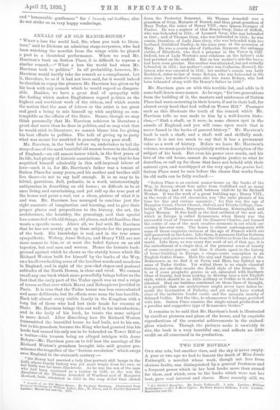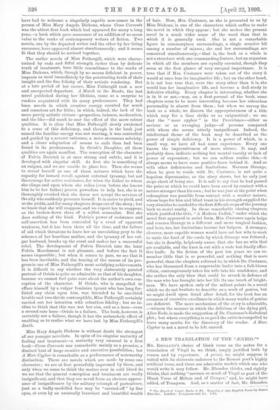TWO NEW NOVELS.*
ONE star sets, but another rises, and the sky is never empty. A year or two ago we had to lament the death of Miss Jessie Fothergill, a novelist whose work, though not free from obvious faults, was distinguished lay a general freshness and a frequent power which in her best books more than atoned for them, and which, even to the books which were not her best, gave real interest and charm. More recently still, we * (10 oriote's Daughtor. Ey Jessie Fotber411. 3 vols. London.: William. Heinemann.'—(S.) More Cl/pito.. By Mary Angola Dickens, 3 vols. London Macmillan and Co.
have had to welcome a singularly capable new-comer in the person of Miss Mary Angela Diekens, whose Cross Currents was the ablest first book which had appeared for many a long year,—a book which gave assurance of an addition of no mean value to the ranks of contemporary writers of fiction. Two novels, one by the departed writer and the other by her living successor, have appeared almost simultaneously; and it seems fit that they should be noticed together.
The earlier novels of Miss Fothergill, which were charac- terised by rude and fitful strength rather than by delicate truth of treatment, bore little resemblance to the works of Miss Dickens, which, though by no means deficient in power, impress us most immediately by the penetrating truth of their insight and the fine felicity of their artistic rendering. But at a late period of her career, Miss Fothergill took a new and unexpected departure. A March in the Ranks, the last novel published during her lifetime, came as a surprise to readers acquainted with its many predecessors. They had been novels in which creative energy counted for much and conscious art for little; in which, indeed, the lack of the more purely artistic virtues—proportion, balance, moderation, and the like—did much to mar the effect of the more robust qualities. It is clear that Miss Fothergill slowly awakened to a sense of this deficiency, and though in the book just named the familiar energy was not wanting, it was controlled and guided by a severer reticence, a more strenuous sobriety, and a closer adaptation of means to ends than had been found in its predecessors. In Oriole's Daughter, all these qualities are again manifest. The conception of the character of Fulvia Dietrich is at once strong and subtle, and it is developed with singular skill. At first she is something of an enigma, and we are unable to place her. Then she seems to reveal herself as one of those natures which have the capacity for inward revolt against external tyranny, but not the courage for active resistance, for when the father to whom she clings and upon whom she relies (even before she knows him to be her father) proves powerless to help her, she is so thoroughly crushed that she dares not accept the services of the ally who suddenly presents herself. It is easier to yield, and so she yields, and for many chapters drops out of the story ; but we know that she will reappear, and we expect her to reappear, as the broken-down slave of a selfish sensualist. But she does nothing of the kind. Fulvia'e power of resistance and self-assertion has been concealed by a crust of apparent weakness, but it has been there all the time, and the failure of aid which threatens to leave her an unresisting prey to the schemes of her heartless mother, and the tyranny of her vul- gar husband, breaks up the crust and makes her a successful rebel. The development of Fulvia Dietrich into the later Fulvia Marehmont is not pleasant, and before the fact it seems impossible ; but when it comes to pass, we see that it has been inevitable, and the tracing of the course of its pro- gress is one of Miss Fothergill's most satisfying achievements. It is difficult to say whether the very elaborately painted portrait of Oriole is quite so admirable as that of his daughter, because we cannot feel quite sure about the author's own con- ception of the character. If Oriole, who is compelled to efface himself by a vulgar feminine tyrant who has long for- feited any claim upon him, was intended to be one-third lovable and two-thirds contemptible, Miss Fothergill certainly carried out her intention with relentless fidelity ; but we in- cline to think that this was not her aim, and as a hero—even a second-rate hero—Oriole is a failure. The book, however, is certainly not a failure, though it has the melancholy effect of enabling us to realise what we have lost by Miss Fothergill's death.
Miss Mary Angela Dickens is without doubt the strongest of our younger novelists. In spite of its singular maturity of feeling and treatment—a maturity very unusual in a first book—Cross Currents was remarkable mainly as a promise, a distinct 'hint of large creative and executive possibilities; but A Mere Cypher is remarkable as a performance of noteworthy distinction. There are novels which are made by some one .character; we are at first powerfully impressed by them, and only when we come to think the matter over in cold blood do we see that the general conception and treatment are really insignificant, and that they are saved from an obvious appear- ance of insignificance by the solitary triumph of portraiture, just as a badly-modelled face may be " carried-off " by fine eyes, or even by an unusually luxuriant and beautiful wealth of hair. Now, Mrs. Custance, as she is presented to us by Miss Dickens, is one of the characters which suffice to make the novel in which they appear ; but she makes the present novel in a much wider sense of the word than that in which it is generally used. She is not a remarkable figure in commonplace surroundings, a single creative hit among a number of misses ; she and her surroundings are conceived simultaneously,---that is, the book as a whole is not a structure with one commanding feature, but an organism in which all the members are equally essential, though they seem at the first glance of very unequal importance. It is true that if Mrs. Custance were taken out of the story it would at once lose its imaginative life ; but on the other hand, it is not less true that, were the story other than it is, she would lose her imaginative life, and become a dull study in defective vitality. Every chapter is interesting, whether she is in it or not,—nay, on a first perusal of the book, some chapters seem to be more interesting because her colourless personality is absent from them ; but when we survey the book as a whole, we discern the appropriateness of a title which may for a time strike us as enigmatical ; we see that the " mere cypher " is the Providence—either as eaviour or as avenging judge—of persons compared with whom she seems utterly insignificant. Indeed, the intellectual theme of the book may be described as the power of simple deficiency. It is a power of which, in a small way, we have all had some experience. Every one knows the impressiveness of mere silence. It may, and probably does, indicate nothing but mental vacuity or lack of power of expression ; but we can seldom realise this,—it always seems to have some positive force behind it. And so with other deficiencies and limitations. Norman Strange, when he goes to reside with Dr. Custance, is not quite a hopeless dipsomaniac, as the story shows, but he only just stops short of being one. It is safe to say that he had passed the point at which he could have been saved by contact with a nature stronger than his own ; but he was just at the point when redemption was possible from contact with a weaker nature, whose hope for him and blind trust in his strength supplied the very stimulus he needed for the first difficult steps of the journey back to moral sanity. In those remarkable closing chapters which justified the title, "A Modern Judith," under which the novel first appeared in serial form, Mrs. Custance again helps and rescues Strange in a different and more tragical fashion, and here, too, her limitations become her helpers. A stronger, cleverer, more capable woman would have set her wits to work to untie the knot of the cords by which Strange was fettered ; but she is dumbly, helplessly aware that she has no wits that are available, and the knot is cut with a rude but finally effec- tive knife. In the fiction of the past ten years we can re- member little that is so powerful, and nothing that is more powerful, than the chapters referred to, in which Dr. Custance, who has blossomed from a respectable loafer into a full-blown villain, contemptuously takes his wife into his confidence, and she strikes the only blow that could be struck in defence of the man who has brought into her life its one touch of bright- ness. We have spoken only of the salient points in a novel which we do not hesitate to describe as a work of genius, but we might dwell upon detail after detail, for the book has an evenness of executive excellence in which many works of genius are deficient. The mere mechanism of the story is admirable, —witness the manner in which the delirium of the dying girl, Alice Eade, is made the suggestion of Dr. Custance's diabolical plot ; but where everything is so good the critic is compelled to leave many merits for the discovery of the reader. A Mere Cypher is not a novel to be left unread.







































 Previous page
Previous page